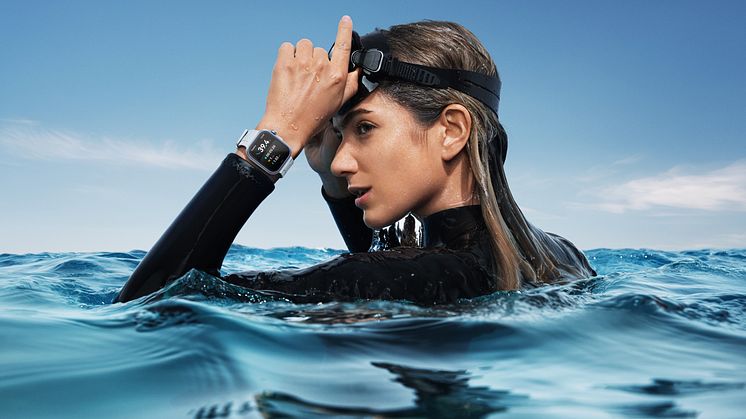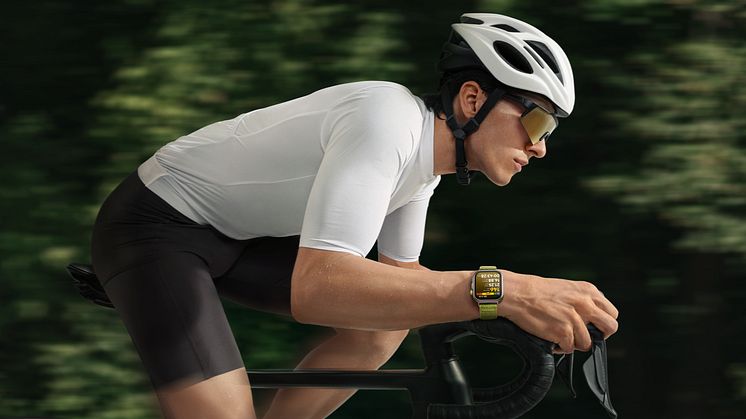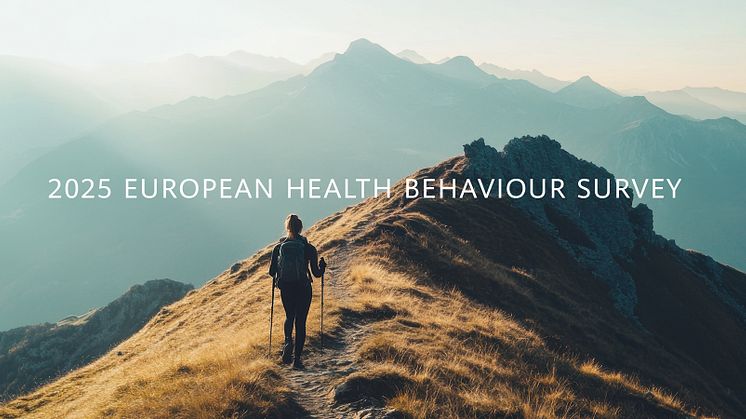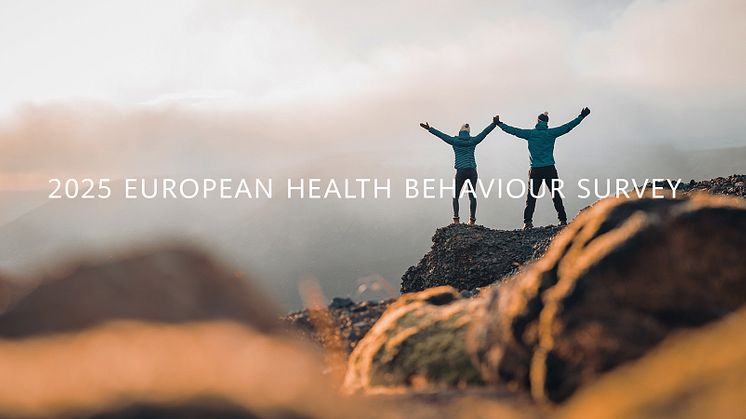
Pressemeddelelse -
2025 European Health Behavior Survey: Over 80% of Smartwatch Users Show Positive Health Changes
Results of the 2025 European Health Behavior Survey[1]conducted by Ipsos and commissioned by Huawei reveal that smartwatches play a transformative role in Europeans’ health management. Over 80% of smartwatch users report positive behavior changes, including increased physical activity and improved sleep habits, highlighting the shift from passive health tracking to active health management.
Smartwatch Adoption Boosts Health Awareness and Behavior Changes
The survey finds that a majority of Europeans (78%) recognize the connection between lifestyle choices and health, demonstrating an increased awareness of proactive well-being management. Among smartwatch users, 80% acknowledge behavior improvements, influenced by device-generated health insights. Regular monitoring of key metrics has further strengthened their commitment to exercise and sleep optimization.
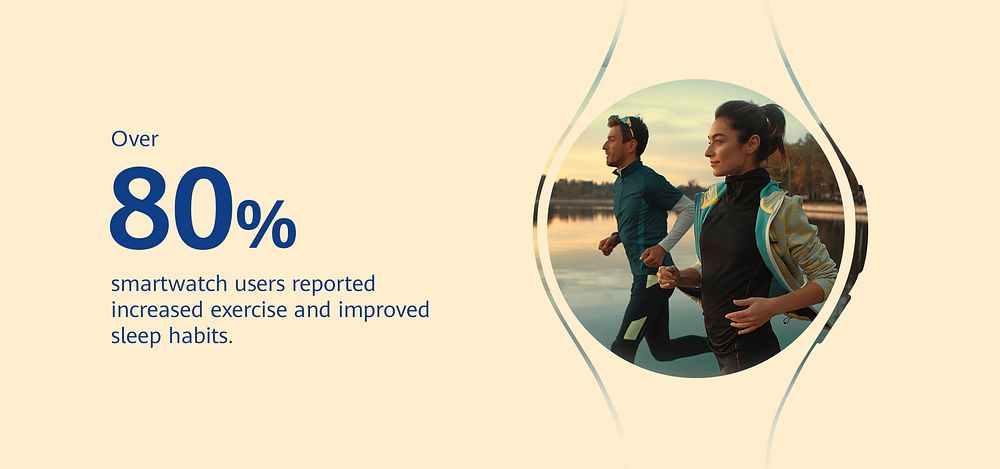
Key Trends Reveal European Health Behavior Transformation
Top 5 health indicators that healthcare professionals (HCPs) consider most important for monitoring include blood pressure, blood sugar level, heart rate/pulse, blood oxygen saturation (SpO2), and electrocardiogram (ECG).
With accessibility of tracking one’s health in mind, HCPs are also increasingly advocating for wearable technology to enhance patient care. 80% of general practitioners recommend smart health devices to their patients, with further 72% of HCPs wishing patients were more proactively aware of their health’s condition and aware what symptoms to pay attention to regarding their health.
Heart Health and Physical Activity Lead Wearable Engagement
Tracking physical activity emerges as the most frequently checked health function (68% daily users), reinforcing its role in daily health routines. Furthermore, 78% of Europeans engage in the minimum level of physical activity as recommended by the WHO[2]guidelines. Still, only 41% of Europeans set a daily step goal, with the average goal being about 7,000–8,000 steps.
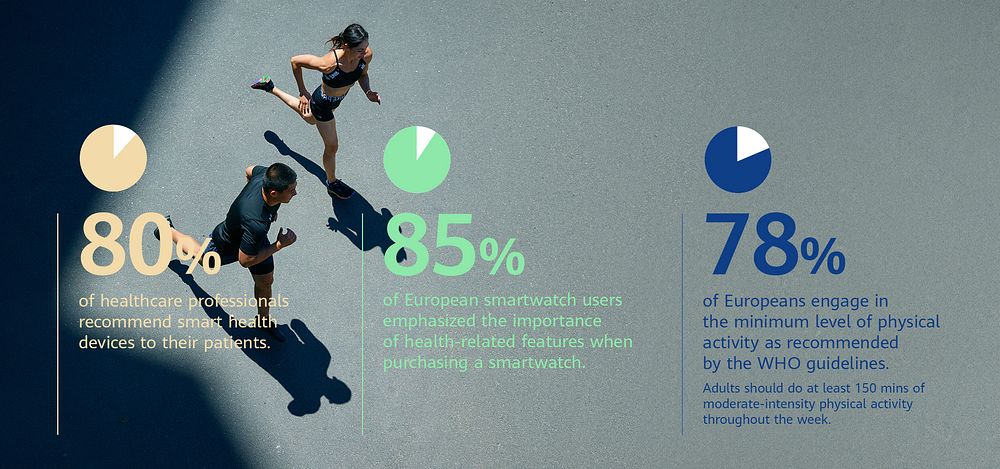
The increasing focus on heart health monitoring aligns with broader smartwatch usage trends, as blood pressure and heart rate rank among the most critical health indicators. Heart rate and pulse monitoring are commonly used and valued health features, with 53% of the European population checking these metrics daily. Moreover, 46% of the study’s respondents regard heart health monitoring as a key health function for a smartwatch, with 85% of European smartwatch users emphasized the importance of health-related features when purchasing smartwatches.
Bridging the Gap Between Consumers’ and Professionals’ Health Priorities
While healthcare professionals emphasize metrics such as blood pressure, blood sugar levels, and ECG data as important, consumers prioritize sleep tracking, calorie monitoring, and hydration tracking. When it comes to frequency of measurement, the majority of HCPs recommend that patients measure their blood pressure (58%) and heart rate (53%) at least several times a week.
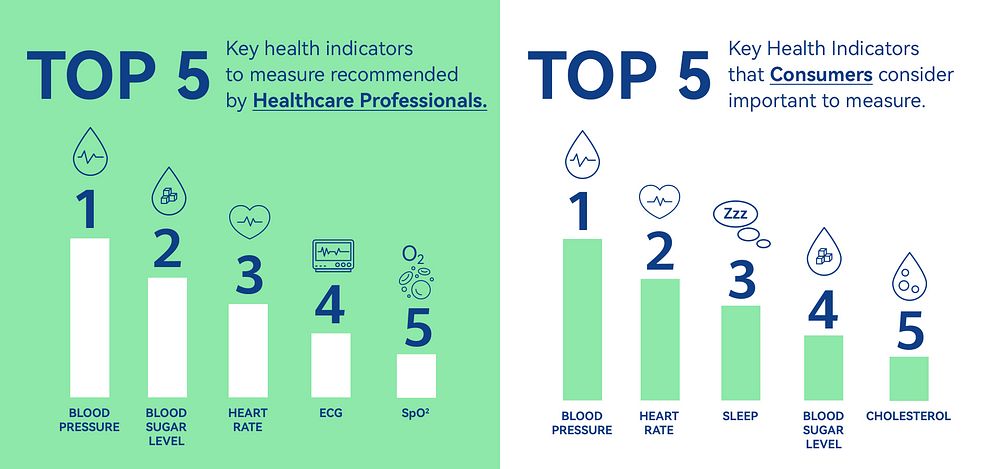
Health-monitoring recommendations from HCPs align positively with consumer opinion about the importance of certain metrics to general health: blood pressure is cited by Europeans as the most important health metric (76%), followed closely by heart rate/pulse. Blood sugar is regarded as the fourth most important on average (72%), after sleep. Here is the first significant disconnect between what the general population regards as important to their health versus what HCPs opine to be important, with only 8% of doctors saying sleep monitoring was an important health measure.
Despite this assumed disconnect between focus and understanding of key health metrics from the point of view of common sense, and of professional medical recommendations, what is exceptionally significant is the fact that 93% of healthcare professionals are already reporting patient visits prompted by a notification obtained from a smartwatch. This signals a positive attitude change of consumers to leading a more aware healthy life, but also a growing trust in health data coming from a smart device.
The Future of Wearable Technology in Health Management
Despite the promising adoption rates, half of the European population still does not own a smartwatch or wearable device, presenting a vast opportunity for expansion. While wearable health technology has gained significant traction among users who actively measure health data to inform their decisions and improve their well-being, most individuals track basic metrics, often due to limited knowledge or the evolving capabilities of wearable devices.
“As technology advances, modern wearables offer more accurate and diverse health insights, making them increasingly attractive, particularly for those with outdated devices or none at all. Continuing innovation in wearable technology has led to Huawei introducing breakthrough medically-certified features in some of its devices for one of the most crucial health metrics – heart health – signaling a shift towards more reliable and actionable wearable health data with highly sophisticated technologies like Heart Rate Variability (HRV). This development could serve as a turning point, enhancing credibility and adoption among both users and healthcare experts. As technological advancements continue, the integration of wearables in health management is expected to further bridge the gap between personal health awareness and professional medical insights” – says Andreas Zimmer, Head of Product at Huawei.
Health Behavior Transformation Signals New European Wellness Phase
Wearable technology is redefining European health management. By aligning consumer needs with professional healthcare expertise, smartwatches are ushering in a new era of wellness - one where individuals take greater control of their well-being and embrace a technology-driven approach to healthier living. With over 80% of smartwatch users in Europe actively improving their health behaviors these devices serve as essential tools for proactive health optimization.
The 2025 European Health Behavior Survey provides compelling evidence that smartwatch users exhibit higher health awareness and are more proactive in monitoring key metrics. While wearable technology does not replace professional healthcare, it serves as an essential tool in reinforcing proactive health behaviors. By bridging the gap between self-monitoring and professional consultation, smartwatches have the potential to empower individuals to take greater control of their well-being.
With wearables evolving beyond raw data collection into meaningful health insights, both users and professionals may find them more valuable than ever. As innovation continues, wearable health technology stands poised to transform how people monitor and manage their health, bridging the gap between consumer interest and professional medical trust.
[1]Methodology: The data presented are based on the on-line study executed in 8 countries: the United Kingdom, Germany, France, Poland, Spain, Romania, Bulgaria, Turkey between 02.04 – 25.04.2025, on a representative sample of about N=1000 respondents aged 18-64; weighted data according to the population of people aged 18-64 in each of the countries.
[2]https://www.who.int/initiatives/behealthy/physical-activity
Emner
About Huawei
Huawei's products and services are available in more than 170 countries and are used by a third of the world's population. Fourteen R&D centers have been set up in countries around the world with several in the Nordics. Huawei Consumer BG is one of Huawei's three business units and covers wearables, audio, PC, tablets, smartphones and cloud services, etc. Huawei's global network is built on over 30 years of expertise in the telecom industry and is dedicated to delivering the latest technological advances to consumers around the world.







